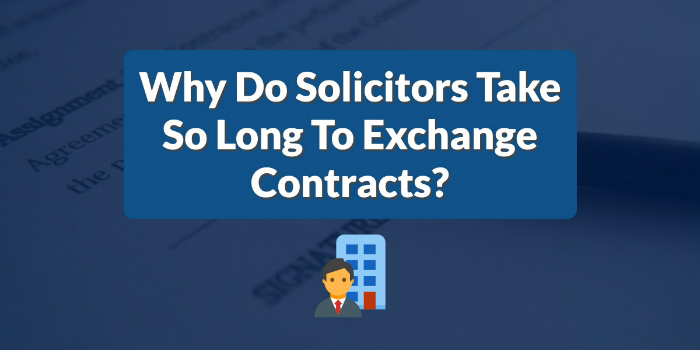The conveyancing process is one of the most frustrating parts of buying a house. But, why do solicitors take so long to exchange contracts?
As we know from experience, there can be numerous reasons, from them simply being bad at their job or having too many clients to handle, through to instructions from the seller, delays in obtaining searches, and even unresponsive buyers.
None of this particularly helps as the longer the conveyancing process takes, the more at-risk you are of being gazumped if you are the buyer or gazundered if you are the seller.
But, if you want to understand why solicitors take so long to exchange contracts, you’ll need to understand what’s involved in the process.
That way, you can more easily spot when a solicitor is taking too long and do something about it.
How Long Do Solicitors Enquiries Take?
The enquiries are usually the very first step of the conveyancing process. This is the part when the buyer’s solicitor requests a draft contract from the seller’s solicitor.
In addition, they’ll usually also send documents such as a property information form that’s been completed by the seller.
The solicitors will then make requests for information or clarification on the documents they have received. These are known as enquiries.
How long solicitors enquiries take depends on how responsive both solicitors and the respective buyers and sellers are. Typically, they will last 1-4 weeks depending on the complexity of the sale.
If the enquiries seem to be taking longer than this it’s worth speaking to your solicitor to find out why.
Selling A Property? FREE Step-By-Step Platform
How We Approach Speeding Up The Enquiries Process
We found that the best way to get enquiries solved quickly is to be prepared. When you decide to sell your property, get all the relevant documents together. In our experience, it’s a good idea to have a folder where you keep all documents relating to your home.
You should include things like planning permissions, certificates for works carried out, warranties for those works or any big purchases, such as boilers, proofs of services carried out etc. This is a tip we wish we knew about when we bought our first house.
Not only did we find it difficult to get all the relevant documentation together when we sold it, but we also weren’t aware that you need certificates for many works that are done, such as rewiring.
This meant we had to find the person carrying out the work and ask them for certificates retrospectively. Not everyone was helpful, which meant we had to get work checked by other professionals to get the documents we needed.
All this took time and in some cases involved additional costs. So take it from us, be prepared and have all documents relating to your house in one place. When you instruct your solicitor after accepting an offer, just hand the whole folder over.
This will give them much information that will likely come up as enquiries and will speed up the process.
What’s The Typical Time From Enquiries To Exchange Of Contracts?
So once the solicitor’s enquiries are completed, does that mean the rest of the conveyancing process is pretty quick and straightforward?
Unfortunately not. The enquiries are only the first step in a relatively drawn-out process.
A transaction that would be considered quick would still typically take around 2-3 weeks from enquiries to exchange of contracts.
A more typical transaction will take anything from 4-8 weeks after enquiries have been completed to reach exchange of contracts. Many take longer.
In fact, when considering why do solicitors take so long to exchange contracts, you probably want to look more at the next stage of the process, solicitors searches.
How Long Do Solicitors Searches Take?

A good solicitor will ensure that they start conducting searches at the earliest opportunity. That’s because the amount of time they take is somewhat out of their control.
If you are buying at the same time as selling, we found that it’s a good idea to ask your solicitor to order the searches as soon as they have heard from your seller’s solicitor. If they haven’t already planned to do so, it will prompt them.
Searches include checking the flood risk of the property, looking for any potential environmental hazards, and confirming how the property is connected to the local water system.
These are all usually conducted by the buyer’s solicitor and rely on reports being sent from various different authorities.
The amount of time solicitors searches take depends on exactly which searches are requested and how quick the authorities providing them are. However, you can easily be looking at 3-6 weeks for all searches to come back.
So you can see, this is a big part of the answer to our question: why do solicitors take so long to exchange contracts?
So, How Long Does It Take To Buy A House From Start To Finish?
If the enquiries and searches are typically the areas where most people see delays then how long does it take to buy a house from start to finish?
Well, if you are purely considering the process from when an offer has been accepted on a property, the conveyancing process takes around 2-3 months.
However, if you consider the entire process from when someone first starts looking at properties then, on average, the process will be around 2-6 months.
Of course, some people spend months, even years, just trying to find the right property. Others literally find a property in a matter of hours.
Generally, purchases and sales with no upward or downward chains complete the quickest and those with multiple buyers and sellers involved take the longest and are at most risk of falling through altogether.
Because of this, we found that it pays to try and keep the chain as short as possible. If you have more than one offer for your house, and one is from a first-time buyer or a cash buyer who doesn’t need to sell a home, they are preferable.
If you buy a house, see if the sellers would be willing to rent accommodation if it looks like they might take longer to find the right onward purchase for them.
We would also recommend considering moving into rented accommodation yourself. In our experience, this is a great way to reduce the length of the chain. It’s especially useful if your property is likely to attract buyers who will have to sell their home first, rather than first-time buyers.
What Can Hold Up The Exchange Of Contracts?
There are a number of things that can hold up the exchange of contracts. These include, but are not limited to:
- Unanswered Enquiries – If a solicitor doesn’t have satisfactory answers to all their queries they won’t want to complete.
- Slow Buyers Or Sellers – Sometimes it’s the buyers or sellers holding up the process (deliberately or otherwise) by not providing information or signing contracts promptly.
- Overworked Solicitors – If a solicitor has too many clients to handle, they may take longer to conduct the work that’s required.
- Complex Transactions – Some transactions are more complex than others if they include non-standard elements.
- Slow Searches – Many authorities are notoriously slow at providing search results which can hold up the entire process.
- Mortgage Lenders – If the buyer needs a mortgage, the speed of the transaction will depend on the speed of the lender.
This may help to answer the general question of ‘why do solicitors take so long to exchange contracts?’, but, to find out what’s holding up your exchange of contracts, you’ll need to ask your solicitor.
A good solicitor should keep you updated on where things are and what they are waiting on throughout the process. But, don’t be afraid to put some pressure on them and ask questions about why things are taking so long.
Just keep in mind that some things may be out of their control and your solicitor is on your side, they need to ensure they protect you during the transaction.
We found that having a good relationship with your solicitor is vital for a speedy and successful conveyancing process. So whenever you communicate with them, be polite, calm and friendly, even if you are angry about something.
In our experience, solicitors want to complete as quickly as possible too and working with them is the best way to achieve this.
What If It’s The Buyer Or Seller That’s Stalling The Exchange Of Contracts?

We mentioned at the start of the article that sometimes it’s the buyers or sellers who delay the exchange of contracts.
This can also happen for a variety of reasons.
If the buyer or seller is in a chain, they may deliberately delay the process to give other parts of the chain a chance to ‘catch-up’.
If problems with the property have been highlighted on a survey, the buyer may want more time to investigate them.
If the buyer or seller is simply getting cold feet they may stall exchanging contracts to give themselves more thinking time.
The same is true if they need more time to sort out their finances or have spotted a better mortgage deal.
It can be hard to know the truth if it’s the buyer or seller that’s stalling the exchange of contracts, but you can use your estate agent to speak to the other party and try and find out their position.
What To Do When Solicitors Are Delaying The Exchange Of Contracts
If all evidence suggests that it is the solicitors that are delaying the exchange of contracts, your first step should be to try and find out why.
If they say the issue is with the other party or their solicitor, you can go through your estate agent to get their side of the story and encourage them to quicken their pace.
If the issue is that they are still awaiting search results, ask them if they can chase the authority that provides them. In extreme cases, ask them how important the search they are waiting on really is.
If you become convinced it’s simply that your solicitor is overworked and isn’t spending the necessary time on your transaction, try putting pressure on them.
Don’t be afraid to walk away and find a new solicitor if your chosen one simply isn’t working out for you. Just be aware that switching solicitors can actually delay the completion even further and so should only be used as an absolute last resort.
Want to ensure you instruct the best solicitor in your area to minimise the risk of delays? Use our handy tool to find a conveyancing solicitor.





